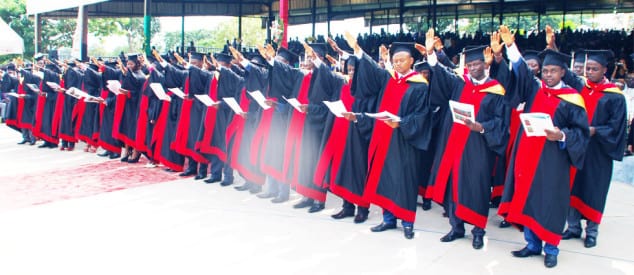
Monday is the 30-year anniversary of Irish singer Bob Geldof‘s (pictured with mic) Live Aid Africa charity event. On the anniversary, author and Centre for Conflict Resolution Executive Director Adekeye Adebajo ultimately concludes that in attempt to “save Africa,” he and his celebrity peers only reinforced negative stereotypes about the continent.
SEE ALSO: Racist Cyclist Who Called African Champion ‘N*gger’ During Race Forced To Donate to African Charity
Keep Up With Face2Face Africa On Facebook!
Geldof and Midge Ure founded “charity supergroup” Band Aid in 1984. Mostly made up of British and Irish singers and musicians, the group sought to raise money to fight famine in Ethiopia with music. That same year, they released the dubious “Do They Know It’s Christmas.”
Consider the lyrics below:
It’s Christmastime; there’s no need to be afraid
At Christmastime, we let in light and we banish shade
And in our world of plenty we can spread a smile of joy
Throw your arms around the world at ChristmastimeBut say a prayer to pray for the other ones
At Christmastime
It’s hard, but when you’re having fun
There’s a world outside your window
And it’s a world of dread and fear
Where the only water flowing is the bitter sting of tearsAnd the Christmas bells that ring there
Are the clanging chimes of doom
Well tonight thank God it’s them instead of you
And there won’t be snow in Africa this ChristmastimeThe greatest gift they’ll get this year is life
Oh, where nothing ever grows, no rain or rivers flow
Do they know it’s Christmastime at all?Here’s to you, raise a glass for ev’ryone
Here’s to them, underneath that burning sun
Do they know it’s Christmastime at all?Feed the world
Feed the worldFeed the world
Let them know it’s Christmastime
Feed the world
Let them know it’s Christmastime
“Do They Know It’s Christmas” became an international success, selling more than 2 million copies and raising more than $24 million.
On July 13, 1985, Geldof would bring nearly 80 of the biggest names in music, including Elton John, Tina Turner, Sting, Run-DMC, Phil Collins, the Who, and Patti LaBelle, together between London and Philadelphia to supposedly make an even bigger impact on hunger in Africa.
“The super concert was watched by an estimated 1.5 billion worldwide, featured 16 hours of live music and raised about £50 million ($A104 million) on the day and about £150 million ($A312 million) in the decades since the event from merchandise sales.”
Despite all of the money that was raised, though, Adebajo contends that its positive impact on Africa was actually the reverse:
Geldof was, in a sense, the pioneer of a new breed of celebrity “missionaries” with his efforts to end the Ethiopian famine. Yet, as American journalist David Rieff has noted, Live Aid’s donations to NGOs such as Oxfam and Save the Children also facilitated the displacement of 600,000 people by the autocratic Mengistu regime, resulting in an estimated 100,000 deaths.
For Adebajo, celebrities looking to help Africa usually only succeed in propagating stereotypes:
Three decades after Live Aid, it is clear that celebrity efforts to “save Africa” have often done more to reinforce negative media stereotypes about the “dark continent” and to portray its one billion citizens as helpless victims in a new “white man’s burden.” The Economist, for example, depicted Africa as a “hopeless continent” in 2000, with its then Africa editor, Richard Dowden, penning an equally prejudiced cover story.
Often naive celebrities have burnished their own reputations as new missionaries of a troubled age: Geldof and Bono are seeking to “end poverty,” George Clooney is “saving” Darfur, Madonna has adopted children in Malawi as if buying new pets, while Prince Harry is on his way to Namibia to “save” the black rhino.
This cult of celebrity has often led to a dangerous dumbing down of serious issues, brushing aside other innovative and resilient grassroots efforts.
Rather than reinforcing stereotypes, Adebajo asserts that a reality check on what the real state of Africa is on the ground is in order:
Amid the new missionary age spawned by Live Aid, it is important to remember that Africa is a diverse continent of 55 countries. Long-running conflicts in Angola, Ethiopia, Liberia and Sierra Leone have been calmed; civil society activists have courageously fought for democratic freedoms in Benin, Zambia, Egypt, Tunisia and Burkina Faso; ruling parties have been voted out of office in Ghana, Senegal, Ivory Coast, Kenya and Nigeria; and members of Africa’s diaspora now contribute $60bn ($40m) annually to their home countries: more than the continent receives in foreign aid.
Africa certainly needs partners in a globalised world, but it may be time to light a bonfire of vanities for the celebrity-missionaries who seek to save us from ourselves.










